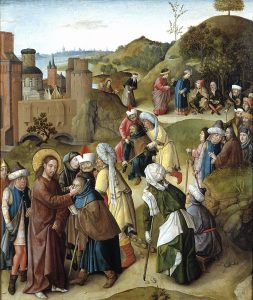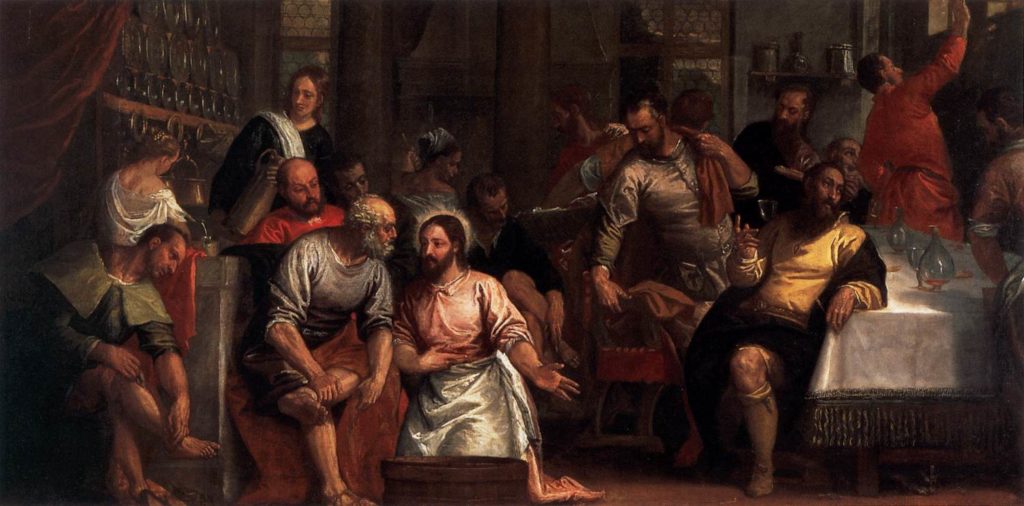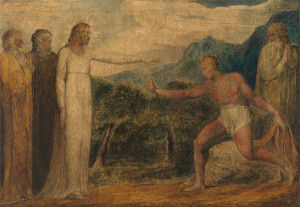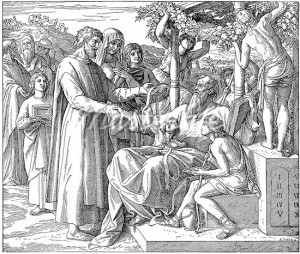Thoughts on Sunday’s Lessons for Oct. 24, 2021
First Reading (Track One): Job 42:1-6, 10-17
When God is with us, when God saves us and makes us well, we show our gratitude with shouts of joy and thanksgiving. Hold this theme of gratitude and grace in your thoughts as we reflect on Sunday’s readings.

Jesus healing blind Bartimaeus near Jericho (c.1470-1479), oil painting on panel by the fifteenth century Flemish painter known as Meester van de Inzameling van het Manna. Museum Catharijneconvent, Utrecht, Netherlands. (Click image to enlarge.)
In the Track One first reading, we join Job after God finally responded to his demands for a hearing: In last week’s passage, God spoke from a whirlwind to remind Job of the magnificence of God’s creation, next to which Job is tiny and insignificant. Now we hear Job quietly, faithfully accepting this. And then comes good news: God restores Job’s fortunes, double what they had been before. Job lives out a long life with riches, a big family and the respect of his friends. Job’s story has a happy ending, but it’s good to remember that even when things don’t get better, God remains God and loves us still.
First Reading (Track Two): Jeremiah 31:7-9
in last week’s Track Two first reading, we heard the Prophet Isaiah’s meditation on Israel’s Suffering Servant, who carried the pain of exile. Now we turn to the Prophet Jeremiah. With loving words and with tears of comfort and joy, Jeremiah tells Israel that God will bring the people out of exile. The weak and the strong, mothers and children, those who can’t see and those who can’t walk, will all come back home together, praising God and giving thanks.
Psalm (Track One): Psalm 34:1-8, (19-22)
Today’s psalm, described as “Praise for Deliverance from Trouble” in the New Revised Standard Version, resonates harmoniously with the story of Job that we heard in the first reading. Sunday’s selected verses begin with a song of praise that exalts God’s name. Then, in a sudden thematic turn, the psalmist remembers a time of terror, when they prayed to the Holy One for deliverance. God indeed saved them from all their troubles, and the psalmist responds with joy: “Taste and see that God is good is good; happy are they who trust in the Most High!”
Psalm (Track Two): Psalm 126
The pain of exile and the joy of return form the base narrative for much of the Hebrew Bible’s psalms and the words of its prophets. We heard that joy in Jeremiah’s happy prophecy in the first reading, and we hear it again in this joyful psalm. It rings in celebration of Israel’s restoration on Mount Zion, Jerusalem, the home of the Temple. Turning to a deeply meaningful image of planting fields and reaping a harvest bounty, these verses ring out in memory of our ancestors sowing with tears, reaping with songs of joy. They went out weeping, carrying the seed; but they brought home ripe sheaves of grain, joyfully shouting out their thanksgiving.
Second Reading: Hebrews 7:23-28
Seeking to bring Jewish converts back to the infant church, the author of Hebrews compares Judaism unfavorably to Christianity in words that sound less than generous to modern ears. These verses, building on those that went before, declare that Jesus is a far greater high priest than the old high priests of the Temple. The Jewish high priests were mere mortal, sinful humans, who had to purify themselves repeatedly through constant sacrifices because they were weak. Perhaps it’s best simply to stand with this reading’s conclusion: Jesus, who has been made perfect forever by God, offers justice for all.
Gospel: Mark 10:46-52
Blind people in ancient times were desperate and ashamed. They had to beg for food, and their neighbors often assumed that their blindness was punishment for some grievous sin. Sadly, physical blindness has also been an enduring metaphor for willful refusal to “see” or believe. Mark’s Gospel uses this image often: He told of such a healing near the beginning of his Gospel, and now again toward the end, repeatedly standing for the apostles’ inability to comprehend Jesus’ message. But blindness is not really the central point of this Gospel. Rather, we see God most clearly in Bartimaeus’ gratitude … and in his decision not to go away but to stay and follow Jesus.



 First Reading:
First Reading: